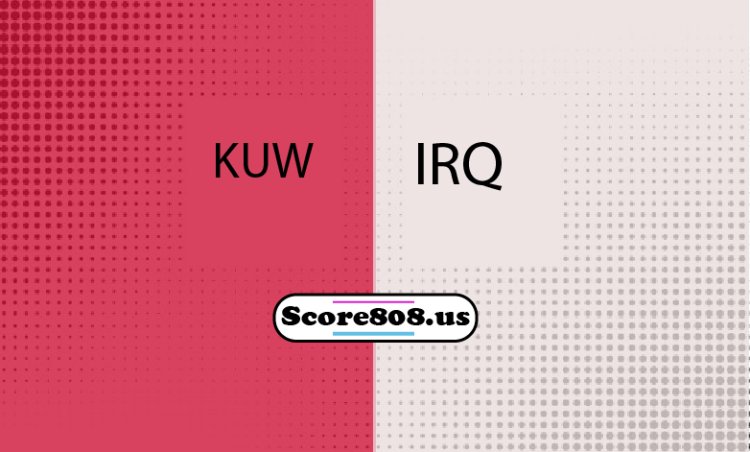Kuwait Vs Iraq
Kuwait Vs Iraq Livestream..

| Stream Link | Quality | Ads |
| Stream Link 1 | HD | 2 |
| Stream Link 2 | HD | 2 |
| Stream Link 3 | HD | 2 |
On Tuesday, a significant number of Iraqi football fans crossed into Kuwait for a World Cup qualifying match, marking the first time they have been permitted to attend a game in the emirate since Saddam Hussein's invasion 34 years ago. This event represents a noteworthy moment in the evolving relationship between Iraq and Kuwait, reflecting the gradual mending of ties that had been strained by decades of conflict and animosity.
A Historic Occasion
The influx of Iraqi fans, arriving in busloads for the 7 p.m. (1600 GMT) match at Jaber Al-Ahmad International Stadium in Kuwait City, underscores a significant step forward in the diplomatic thaw between the two nations. The match, which features Iraq leading Group B of the Asian Football Confederation's qualifying matches for the 2026 World Cup, symbolizes more than just a sporting event. It highlights the slowly warming relations between Iraq and Kuwait, two decades after the fall of Saddam Hussein’s regime in 2003.
"I can't explain how I feel," remarked Abbas Abdelatif, a middle-aged Iraqi, as he prepared to board a bus in the southern Iraqi city of Basra, which borders Kuwait. "I haven't seen Kuwait in more than 30 years. There was war and problems, but now, God willing, the situation will get better and better."
A Complex History
The relationship between Iraq and Kuwait has been fraught with tension since Saddam Hussein’s invasion of Kuwait in August 1990. Hussein's brief annexation of the emirate was met with a strong response from a U.S.-led coalition, which ousted Iraqi forces during the Gulf War. In the aftermath, Iraq was subjected to severe international sanctions and was required to pay over $52 billion in war reparations, a debt that was finally settled in 2022.
Despite the improvements in relations since Saddam's ouster, several issues continue to challenge the diplomatic landscape. For example, last year, Iraq’s top court declared an agreement demarcating maritime borders with Kuwait unconstitutional, a decision that temporarily strained the burgeoning goodwill between the two nations.
Football as Diplomacy
Iraq has been actively using football as a tool for diplomacy to repair its relationships with Arab Gulf states. This approach has been part of a broader effort to rehabilitate Iraq's international image following years of conflict, including the war against Islamic State, which concluded in late 2017. A notable milestone in this diplomatic effort was Iraq’s hosting of the Gulf Cup in Basra last year, marking the first time since 1979 that the tournament was held in the country. This event was seen as a significant step in Iraq’s reintegration into regional affairs.
Yousif Faal, spokesperson for the Iraqi football federation, expressed hopes that the historic rivalry between Iraq and Kuwait, once considered the Arab world's greatest, would remain confined to the football pitch. "It's a sporting competition; we should not insert politics into this," Faal emphasized.
Challenges and Controversies
While the match represents a hopeful development in Iraq-Kuwait relations, it has not been without its controversies. Sensitivities surrounding the event were evident in the initial reports suggesting that few or no Iraqi fans would be allowed to attend. This led to warnings from Basra’s governor about potential reciprocal measures. However, Iraq's ambassador to Kuwait later confirmed that 5,000 fans would be permitted entry, provided they met specific passport and vehicle requirements.
Abdulaziz Alanjeri, founder of the Kuwait-based think tank Reconnaissance Research, noted that while Kuwait desires good relations with its neighbors, including Iraq, it requires Iraq to demonstrate its commitment to resolving outstanding issues, particularly the maritime border dispute. "Kuwait ... wants good relations with its neighbors, especially Iraq, but Iraq must show and confirm its good intentions by resolving some issues, most notably the maritime border issue," Alanjeri stated.
Additionally, old grievances occasionally resurface. For instance, Adnan Dirjal, president of Iraq's football association, mistakenly referred to Kuwait as a province during an interview, echoing Saddam’s 1990 claim that Kuwait was Iraq’s 19th province. Although Dirjal later apologized for his remark, the incident highlighted the lingering sensitivities surrounding the historical conflict.
A Symbolic Gesture
The return of Iraqi fans to Kuwait for this World Cup qualifier is seen as a symbolic gesture of goodwill and a step toward normalizing relations between the two nations. Many Iraqis view the match as a positive sign of progress. "I hope the legacy of the former regime dies with this new generation," said Amer Hakim, an Iraqi supporter. "The Iraqi people are not to blame for what happened because of Saddam Hussein."
This sentiment reflects a broader desire among both Iraqis and Kuwaitis to move past the historical animosities and focus on building a cooperative future. The presence of Iraqi fans at the game is a testament to the enduring appeal of football as a unifying force, capable of bridging divides and fostering dialogue between nations with a shared interest in sports.
Conclusion
The World Cup qualifier between Iraq and Kuwait represents more than just a football match; it is a milestone in the ongoing reconciliation between the two countries. The event underscores the potential for sports to act as a diplomatic tool, aiding in the healing of historical wounds and the fostering of international camaraderie. As Iraq and Kuwait continue to navigate their complex relationship, the hope is that such sporting events will pave the way for deeper understanding and collaboration, moving beyond the shadows of the past toward a more harmonious future.














